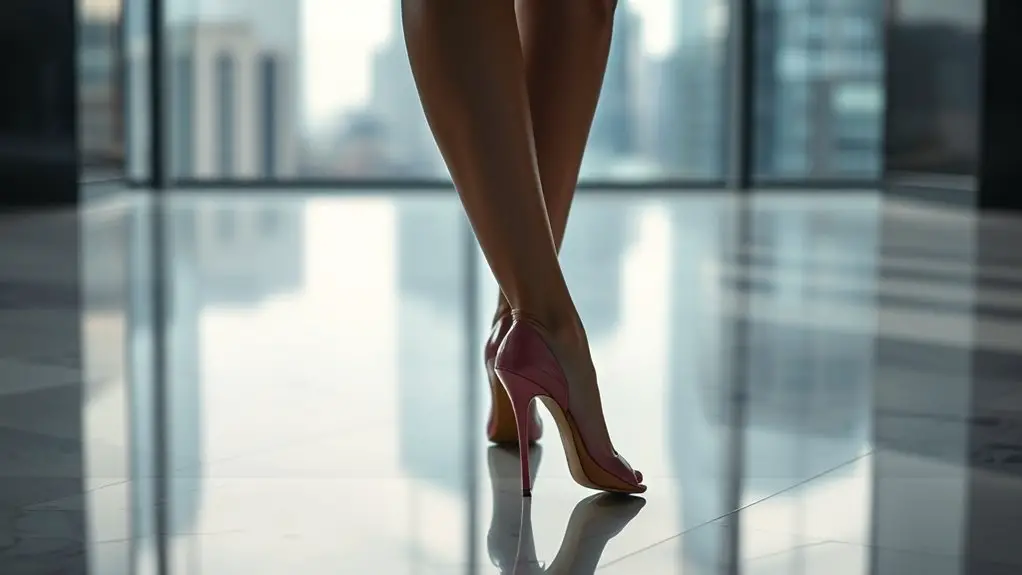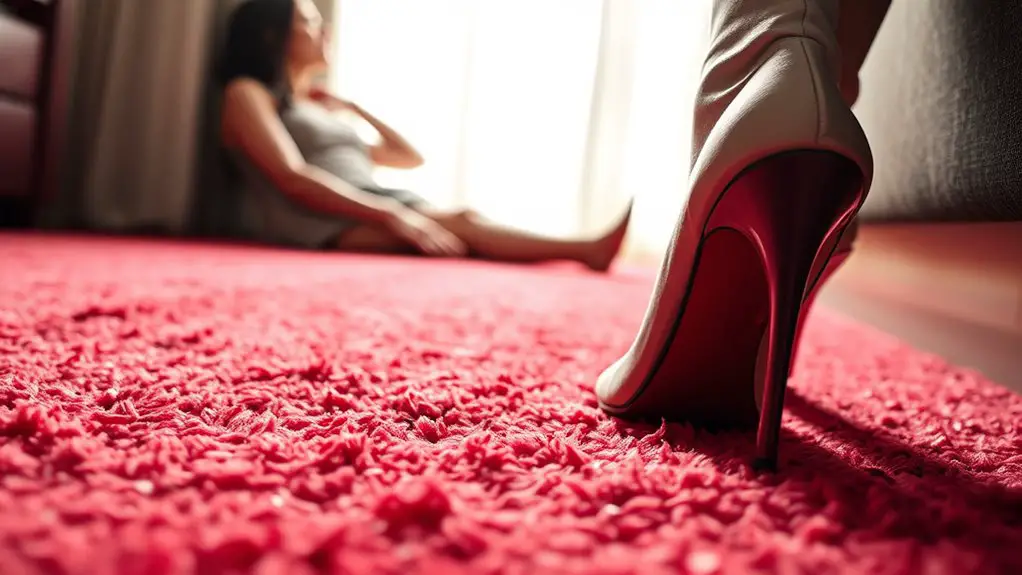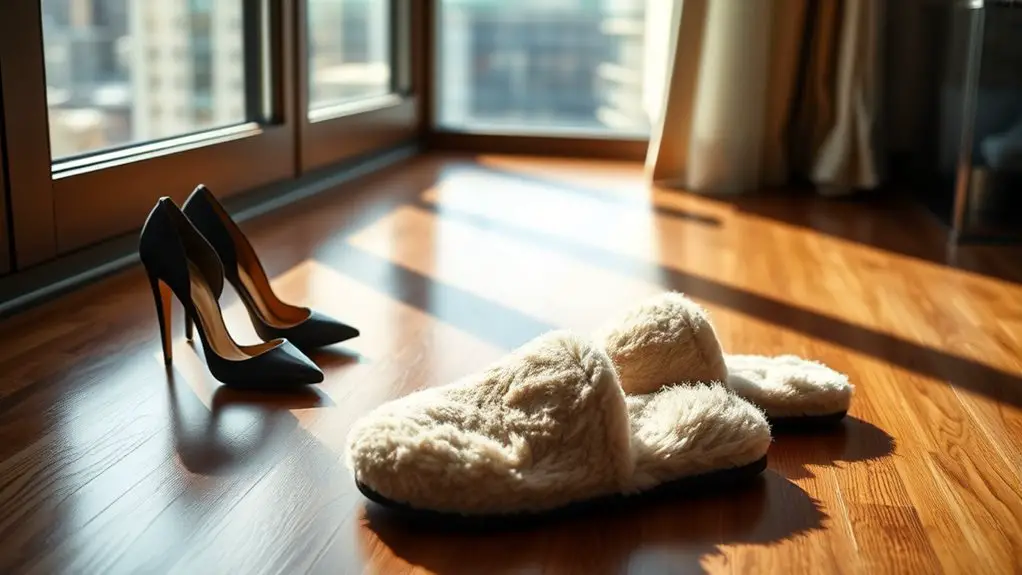Wearing heels daily can enhance your confidence and self-esteem, but it also comes with psychological trade-offs. While 67% of women feel more empowered in heels, the pressure to conform to beauty standards may lead to anxiety and self-doubt. Physical discomfort can further complicate your self-image, creating a disconnect between how you feel and how you present yourself. Understanding these dynamics can help you navigate your choices better, revealing insights into the balance of comfort and style.
The Allure of High Heels: A Symbol of Empowerment

The allure of high heels often lies in their ability to evoke a sense of empowerment and confidence. When you slip on a pair, you’re not just enhancing your height; you’re stepping into a cultural narrative that celebrates femininity and strength. High heels carry empowerment symbolism, reflecting resilience and ambition in various contexts. Historically, they’ve been associated with status and authority, often worn by influential figures.
The cultural significance of high heels extends beyond mere aesthetics; they embody a complex relationship between identity and societal expectations. Research indicates that wearing heels can positively impact your self-perception, making you feel more assertive. This isn’t to say that they’re universally empowering for everyone, but for many, they serve as a tool for expressing confidence and agency. Acknowledging this duality can help you understand the psychological effects of wearing heels in your daily life.
Societal Pressures and Beauty Standards
You might feel torn between the confidence that high heels can provide and the discomfort they often bring, a struggle shaped by societal norms and beauty standards. These expectations can pressure you to conform, prioritizing appearance over comfort, which can lead to psychological distress. Understanding this dynamic is essential, as it highlights the need to balance personal comfort with societal ideals.
Fashion Norms and Expectations
While societal pressures often dictate what is deemed fashionable, the expectation to wear high heels transcends mere aesthetics, influencing both self-esteem and identity. This pressure often leads to fashion conformity, as many feel compelled to adhere to cultural influences that glorify heels. You might find yourself caught in a cycle where your self-worth is tied to how well you meet these standards.
| Aspect | Impact on Self-esteem | Cultural Influence |
|---|---|---|
| High Heels | Boosts perceived status | Seen as a symbol of femininity |
| Fashion Conformity | Leads to anxiety | Reinforces stereotypes |
| Non-conformity | Can cause isolation | Challenges societal norms |
Understanding these dynamics can help you navigate your choices more mindfully.
Confidence vs. Discomfort
Confidence can be a double-edged sword in a world where beauty standards often prioritize appearance over comfort. Wearing heels can give you a noticeable confidence boost, making you feel more powerful and stylish. However, this comes with a discomfort trade-off that can’t be ignored. Research shows that chronic heel wearers frequently experience foot pain and long-term health issues, which can overshadow that initial boost in confidence. You might find yourself torn between the allure of fitting societal expectations and the physical discomfort that follows. This conflict can affect your mental well-being, leading to anxiety or self-doubt. Ultimately, it’s essential to balance the desire for confidence with the necessity of comfort, recognizing that true beauty often lies in feeling good, both inside and out.
The Physical Discomfort of Daily Wear

Wearing heels every day can lead to significant foot pain and other discomforts that you might not immediately associate with your shoes. Over time, these shoes can drastically alter your posture and alignment, putting strain on your body and leading to long-term issues. Understanding these impacts is essential for making informed choices about your footwear and overall well-being.
Foot Pain Consequences
Although many individuals embrace the elegance of high heels, the daily wear can lead to significant foot pain that often goes unrecognized. Chronic pain can develop, impacting not just your feet but also your overall well-being. Over time, you may experience mobility issues, hindering your ability to perform daily tasks comfortably.
| Condition | Symptoms | Long-term Effects |
|---|---|---|
| Plantar Fasciitis | Heel pain, stiffness | Difficulty walking |
| Bunions | Swelling, burning | Chronic foot pain |
| Achilles Tendinitis | Pain in the heel | Reduced mobility |
| Metatarsalgia | Pain in the ball of foot | Altered gait patterns |
Recognizing these consequences can help you make informed choices about your footwear and prioritize your foot health.
Posture and Alignment Issues
When you don high heels regularly, the strain on your body goes beyond just your feet; it can lead to significant posture and alignment issues. High heels often create a postural imbalance, forcing your body to compensate, which can cause your spine to misalign. This misalignment may lead to discomfort in your back, neck, and shoulders, as your muscles struggle to adapt. Research shows that prolonged wear can alter your natural gait, further exacerbating these issues. You might notice an increase in fatigue and tension as your body works harder to maintain balance. Understanding these effects is essential, as addressing them early can help prevent long-term damage and improve your overall well-being. Prioritizing proper footwear may mitigate these risks.
The Impact on Self-Esteem and Body Image
While high heels can enhance a person’s appearance and project an image of confidence, the daily wear of these shoes often leads to complex feelings about self-esteem and body image. You might experience a temporary confidence boost when slipping on those stylish heels, but this perception can be misleading. Research shows that prolonged use can distort your self-image perception, making you feel more self-conscious about your height and body shape.
As you walk in heels, you may be aware of how others perceive you, which can create a disconnect between your inner self and outer appearance. The pressure to maintain that elevated status can lead to anxiety and insecurity, overshadowing the initial confidence you felt. Ultimately, this can negatively impact your overall sense of self-worth, highlighting the intricate relationship between footwear choices and psychological well-being.
Balancing Comfort and Style

Finding a harmonious balance between comfort and style can be a significant challenge for those who wear heels daily. You might feel the pressure to maintain aesthetics while compromising on comfort, which isn’t easy. Many women report discomfort as a trade-off for style versatility, but understanding your needs can help.
| Aspect | Comfort Aesthetics | Style Versatility |
|---|---|---|
| Heel Height | Lower heights often provide better support. | Higher heels can elevate outfits. |
| Material | Soft, flexible materials enhance comfort. | Trendy materials can boost visual appeal. |
| Footbed Design | Cushioned footbeds reduce fatigue. | Unique designs can make a statement. |
| Shape | Rounded toes can alleviate pressure. | Pointed toes can elongate the leg. |
Finding Alternatives: Stylish Yet Comfortable Footwear
Although many women feel pressured to wear heels for their aesthetic appeal, there are stylish alternatives that don’t sacrifice comfort. Comfortable sneakers, for instance, can seamlessly blend with casual and semi-formal outfits, offering both support and style. Stylish flats provide a chic option for those seeking a sophisticated look without the discomfort of heels. Supportive sandals can elevate your summer wardrobe while ensuring your feet remain happy.
Chic loafers are perfect for a polished appearance at work, while versatile boots can shift from day to night effortlessly. If you’re looking for a bit of height, trendy wedges offer stability with a fashionable edge. Opting for footwear made from breathable materials and ergonomic designs can also enhance your overall well-being. Embracing these alternatives allows you to prioritize comfort without compromising on style, fostering a healthier mindset and boosting your confidence.
Frequently Asked Questions
Do High Heels Affect Mental Health Over Time?
They say, “Beauty is pain.” While high heels can provide a confidence boost, heel discomfort over time might lead to negative mental health effects, overshadowing that initial uplift. Balance style with comfort for lasting well-being.
Can Wearing Heels Influence Career Success?
Wearing heels can indeed influence career success; they often enhance heel confidence and improve professional perception. When you feel empowered, others may recognize your competence, potentially leading to greater opportunities and advancement in your field.
How Do Men Perceive Women in Heels?
Studies show that 72% of men find women in heels more attractive. Heels can enhance attraction dynamics, giving you a confidence boost that influences perceptions. This combination can markedly impact how men view your presence and poise.
Are There Age-Related Effects From Wearing Heels?
Wearing heels can lead to age-related effects, such as increased physical discomfort over time. As you age, your body may struggle with the strain heels put on your joints, potentially exacerbating issues like arthritis or chronic pain.
What Are Some Psychological Benefits of Wearing Heels?
Imagine slipping into a pair of heels; you instantly feel taller, more poised. This confidence boost enhances your self-expression, influencing how others perceive you and how you perceive yourself, ultimately shaping your daily interactions.
